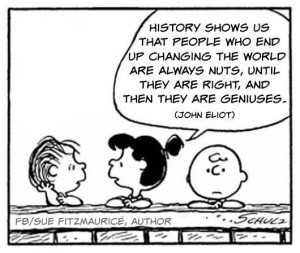人類的「文化/文明」culture 有三種徵狀:
1. 文物 artifacts
2. 制度 social-economic-political system
3. 精神 / 信念 / 意識形態 spiritual dimension
而其中最重要的,就是第三種徵狀這個「文化/文明」的根基,
有多接近真理,是否願意自強不息,不斷批判,去蕪存菁,
因為第二種徵狀 [制度] 是從第三種徵狀衍生出來的。
所以關於「文化/文明」,筆者採納 A. C. Grayling 的定義:
I use the term ‘culture’ in a non-anthropological
sense to mean the human practices and products
which civilise──that is, which add amenity, insight,
pleasure, significance and value to individual and
social existence through excellences of thought,
performance, and artefact.
Culture in this sense is connected to ethics,
not as either a necessary or a sufficient condition
for any individual’s doing good to others,
but as a necessary condition for the possibility of
there being good lives to be lived by individuals.
( A. C. Grayling, The Reason of Things, p.12 )
[人類是否可能有下一階段的進化?]
知識爆炸,配合了互聯網的發展,
只不過是加速了人類文明進化的前四個階段,
並不表示人類會進化到一個新的階段。
量變是否一定能夠引起質變,誰能肯定?
When kids look up to great scientists/philosophers
the way they do to great musicians and actors,
civilization will jump to the next level.
( Brian Greene, slightly modified by Jason Ling )
由於人類這種高層次、嚴謹的理性,
在人類文明進化中發展得最晚,
所以大部份人依然重視情緒多於重視理智,
需要透過努力不懈的學習,才可以擺脫情緒的束縛。
除了在消費方面,
大部份人在思想和意識形態之上,
亦依然擺不脫羊群心理,要從群眾之中尋找安全感。
看來人類文明的繼續進化,必須解決兩大課題:
☆ 究竟甚麼是「進步」?如何定義?
☆ 甚麼叫做「精英」?如何定義?
人類既有「偏才的精英」,亦有「通才的精英」,
更有智力平庸但人格高尚的「人格的精英」!
如何分辨及選擇這些「精英」?
如何鼓勵及培育這些「精英」?
分辨、選擇及培育「偏才的精英」,是「教書界」的職責;
分辨、選擇及培育「通才的精英」和「人格的精英」,
是「教育界」的職責。
One machine can do the work of fifty ordinary men.
No machine can do the work of one extraordinary man.
( Elbert Hubbard )
No great man lives in vain.
The history of the world is
but the biography of great men.
( Bejamin Disraeli )
但下一個階段的進化在千禧年代已經蒞臨,
在「優秀人腦配合人工智能電腦和機械人」飛躍發展的未來十年,
政治、軍事、社會、教育、商業、管理、道德…各方面,
都會面臨翻天覆地的變化,也許會是「人類文明進化 5.0」,
因為未必所有掌權者都認為科技應該為整體人類服務,
而大部份人還未覺得需要建設烏托邦,在地球上製造人類的天堂!
優秀的民主,必然是多數愚蠢人服從極少數的智者,
一向靠的是「教育界」培育出來的通才及人格精英,
不是靠大量接受過「教書界」培育出來的中產階級,
甚至其中的偏才精英。
沒有優秀的民主,那些思考力不足、心腸不夠惡毒的人類,
將會面臨大規模的失業,成為新世代的蜜蜂和螞蟻人,
喪失了主、抉擇、基本的人權與生存發展的機會,
成為邪惡掌權者控制的「奴隸/行屍走肉」,日日為生活奔波,
面對一個生存挑戰和心理壓力非常強烈的悲慘世界。
青少年再沒有「生涯規劃」,只有克勤克儉的「生捱規劃」!
Civilization is maintained by a very few people
in a small number of places
and we need only some bombs and a few prisons
to blot it out altogether.
( Cyril Connolly )
Driven by greed, ignorant of their connectedness
to the whole, humans persist in behavior that,
if continued unchecked, can only result in
their own destruction.
( Eckhart Tolle )
Humanity is now faced with a stark choice:
Evolve or die.
( Eckhart Tolle )
人類必須問自己:
我們一向對人性的認識是否正確?
我們以前認為的「精英」是怎麼樣的?
現在我們是否需要修訂、修正我們的定義?
There is something that is much more scarce,
something finer far, something rarer than ability.
It is the ability to recognize ability.
( Elbert Hubbard )
Civilization exists precisely so that
there may be no masses but rather
men alert enough never to constitute masses.
( Georges Bernanos )
人類和猿猴之間的基因有 99% 完全相同;
各式各樣人類之間的基因,則有 99.5% 完全相同。
換言之,人與人之間的分別,在於那小數後的第二位,
關鍵就在於那 0.01% 至 0.09% 基因的不同,
的確是「差之毫釐,謬以千里」!
問題是一旦證實了外太空另一更先進的文明的確存在,
而他們那些比人類更高級的生物的基因,
會否屬於那 0.05%-0.09% 的差異,
而人類智愚之間基因差異只不過是 0.01%-0.04%?
如果說人類是萬物之靈,所以有權統治世界,
那麼外太空更先進的文明,是否有權統治人類?
進化論中最令人感到悲哀的是,
由於人類進化的過程中,群體的影響力鉅大,
所以必須將「精英」團結在一起,
以免被平庸的大眾排擠,受到心理傷害而致貶值。
如果不能夠好好地去定義「精英」,
然後從人類中選擇一群「精英」出來,
讓他們在地球一片土地之上另組一個社會,內部通婚繁殖,
人類就不可能有下一階段的進化!
The best people possess a feeling for beauty,
the courage to take risks,
the discipline to tell the truth,
the capacity for sacrifice.
Ironically, their virtues make them vulnerable;
they are often wounded, sometimes destroyed.
( Ernest Hemingway )
大部份人渴望和平,卻不願意付出代價,只想佔便宜,
他們熱愛面子和享受,但卻懶於思考,討厭批判思維。
這種現象的確是人類社會的一大諷刺!
All progress has resulted from people
who took unpopular positions.
( Adlai E. Stevenson )
現代人佔了上兩個世紀科學精英的便宜,
不但自己沒有付出代價,而且我們發現在教育方面,
人類竟然鄙薄「真和誠」這種科學精神的價值,
亦是人類社會的一大諷刺!
Modern Western civilization is the result of
endowing with the fruits of a dozen men of genius
a population which is emotionally at the level of savages
and culturally at the level of schoolboys.
( Cyril Joad )
Almost everything that distinguishes the modern world
from earlier centuries is attibutable to science,
which achieved its most spectacular triumphs
in the seventeenth century.
( Bertrand Russell, A History of Western Philosophy )
這個實驗其實可以進行,
而且可以挑選幾個不同的「精英」定義,
組織幾個不同的「精英」社會,
看看幾百年後有甚麼現象?
然而這麼長久的實驗誰會做?
所以我們現在只能夠期望人類文明的進化,
不能夠期望人類的進化。
Matthew Lieberman
The social brain and its superpowers
John Cacioppo
The lethality of loneliness
參考:
Michio Kaku
Mankind Has Stopped Evolving
https://www.youtube.com/watch?v=UkuCtIko798
